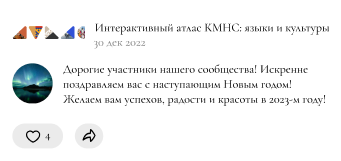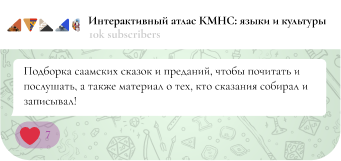Dr. Goncharov
Junior Research Fellow, Department of Ethnography of Siberia, Museum of
Anthropology and Ethnography, Russian Academy of Sciences
The Yukaghirs. Modern culture and crafts, folklore groups, professional art
Explosive changes of the 20
th
century resulted in transforming the modes of ethnic cultures’ existence. Indigenous peoples of the USSR and then Russia ubiquitously demonstrated their culture in performing groups’ concerts.
For instance, the Verkhnekolymsk district has the folk dancing group Londol established in 1971 by Lyudmila V. Babulina. The performing group’s objective is studying, preserving, developing, and promoting Yukaghir folk dances and throat singing. The group has an extensive repertoire of ethnic dances of Yukaghirs, Evens, Yakuts, Russians, and other peoples, dances imitating rituals (“Sun worship”), choreographic shorts, play dances. The group also uses modern choreography and re-invents deep aesthetic layers of local peoples. Londol performed at many Yakutian and national shows, at festivals in Irkutsk, Yakutsk, the village of Ust-Nera, and other villages and cities of Russia.
The Even-Yukaghir folk performing group Nerivden from the village of Andryushkino studies and revives the unique choreographic culture of Northern peoples and preserves for the posterity the elements of Even-Yukaghir traditions. Nerivden performs at folk celebrations (for instance, the Arctic Day), Congresses of the Yukaghir people, and other sociocultural events connected with the population’s ethnic culture. There are also other folk Yukaghir performing groups such as Maaruol, Yerpeydie, and Yarkhadana.
Yakutsk has a Yukaghir ethnic folk ensemble Kolymchanka (The Kolyma Woman). It was established in November 2017 at the Vekhnekolymsk Yukaghir community; it is led by Tatiana V. Banderova. Kolymchanka’s repertoire includes songs in Yukaghir, Yakut, and Russian with lyrics by local poets. Songs are sung to the accompaniment of the drum, the Yukaghir harp
yakhte
, to the musical instrument made of deer hooves, to the accordion. In 2018, the ensemble won the grand prix at the 5
th
Echo of the Tundra and the Taiga Yakutian competition. In 2019, the ensemble participated in the 14
th
International Competition Festival “Treasures of the North” in Moscow where they won a special award. The ensemble frequently performs in Yakutsk and is the winner and runner-up in many Yakutian and city competitions.
Since 2009, Yarkhadana, the charity foundation for the revival of the Yukaghir people, had been working in Yakutia. In 2020, the Kuzhuun shorile (Rainbow) project won a presidential grant; the project run in Yakutia works toward preserving the Yukaghir language and culture by supporting public initiative. In October 2021, the first academic dictionary of the Forest Yukaghir language was published. The project’s geography spans the Verkhnekolymsk, Nizhnekolymsk, Ust-Yana, and Allaikhovsky districts of Yakutia.
Nikolay I. Spiridonov (Teki Odulok) was the first Yukaghir writer and ethnographer who wrote
The Life of Imteurgin the Elder
,
Life in the Far North
, etc. inspired by Spiridonov’s own experiences of living in difficult, yet unique conditions of the North. Yukaghir art and literature of the second half of the 20
th
century are vividly reflected in the works of the Kurilov brothers who hailed from the Nizhnekolymsk district. The elder brother, Semyon N. Kurilov, was a writer; he wrote
See You in Tundra
,
Khanido and Khalerkha
,
New People
. Gavril N. Kurilov (pen name Uluro Ado) is not only a writer, but also a linguist. He mostly wrote poetry dedicated to the Yukaghir people. The younger of the three brothers, Nikolay N. Kurilov, smoothly combines the roles of a writer and an artist. He graduated from Vasily Surikov Art School and, as a graphic artist, he expends much time and effort on creating visual images of the Far North and graphic and pictorial conceptualization of the traditional culture of the peoples of the region.






















































